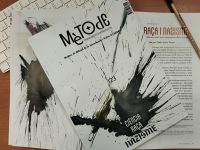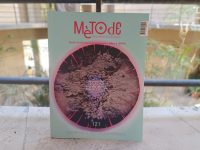Interview with Bernadette Bensaude-Vincent
The social image of chemistry: Fear and hope
Full Professor of Science History and Philosophy at the University of Paris

Perhaps among the features that best characterise the work of Bernadette Bensaude-Vincent, Professor of History and Philosophy of Science at the Paris-Sorbonne University, are her tireless efforts to build intellectual bridges and help us understand science in the past and present. Born in Béziers (France) in 1949, she is married and has three children. Bensaude has built bridges between the history and philosophy of science, enabling us to integrate knowledge of the past in philosophical reflection on the status of an experimental science like chemistry; bridges between past and present, helping us understand current chemistry from a historical perspective; bridges between science and society, each with their own knowledge, fear and ignorance. We talked about all this with her, about chemistry, history and philosophy, experts and laymen, ignorance and fear. She is the author of dozens of books and hundreds of articles in which chemistry, its production and its social image, play a major role.
Why would someone like you, with philosophical training, devote your life’s work to the history of an experimental science like chemistry?
I first touched on chemistry when I was preparing my Agrégation de philosophie exam at 21 years old. The topic chosen for the competitive exam that year was «matter». Since then I have not stopped «philosophising about matter», but not as a general but rather as a specific concept, namely, materials. And, working on matter, it was hard not to come across chemistry.
And presumably chemists too. What have you learned from them?
Indeed, I have been fortunate enough to converse with many chemists and perceive their vision of chemistry. That has enabled me to identify some of the philosophical issues inherent to this science. I quickly realised that chemistry was, in a way, the poor relation of epistemological reflection. The vast majority of science philosophers were more interested in physics and biology. This led me to wonder if it was possible to construct a philosophy of chemistry, considering its specificities, and to be able to define it without reference to physics.
Do you think, then, that chemistry essentially differs from physics?
From my point of view, the very essence of chemistry in itself does not exist. Its identity has been built over a long history of different and manifold practices; its specificity has been taking shape in the many battles fought in support of academic and social recognition, as well as the continuing disputes between different practitioners. It is precisely this idea that sparked my interest in the history of chemistry and then I discovered there was a real chemists’ culture, moreover, that there were different cultures of chemistry –cultures that philosophers have long ignored–.
«The very essence of chemistry in itself does not exist. Its identity has been built over a long history of different and manifold practices»
One of your main research fields has dealt with the work of Antoine-Laurent Lavoisier. You took part in numerous events and publications related to the bicentennial celebration of his death. Now that almost two decades have gone by, can we assess the repercussions this commemoration has had on how this scientist and the chemical revolution are viewed?
Celebrations always provide the chance for historic figures to be revived and gain visibility. They can also serve to take balance of the work carried out since the last memorial. This is what happened with the commemoration of the bicentenary of Lavoisier’s death, in 1994. Dozens of meetings and conferences were held in France and in many other countries and there were countless publications. And yet, I cannot truly say that all this gave rise to a consensual interpretation of the chemical revolution. On the contrary, all these acts, which brought together professional chemists and historians of science, merely revealed the gulf between the Lavoisier cult, Lavoisier as the founder of modern chemistry, which is still deeply rooted among chemists and the much more nuanced interpretations of historians.
Does that mean that historical research has failed to change the image of the chemical revolution engraved in the collective memory of chemists?
The disagreement is not only between scientists and professional historians. The 1994 commemoration highlighted the diversity and divergence of views between the «Lavoisier scholars». It is true that few historians today defend the idea that there was a crucial event that sparked the chemical revolution or that Lavoisier was a founder figure of chemistry. However, the rejection of a naive positivist view of this type has not given way to a coherent view of the process that took place during the last two decades of the eighteenth century, nor the exact role Lavoisier played in this process.
Your book Lavoisier: Mémoires d’une revolution (Lavoisier: Memories of a Revolution), published in 1993, was an invitation for critical reflection on the figure of the French chemist, whose hagiographic tone was unlike a great many books and events commemorating the bicentennial. What did you hope to achieve with this book and what do you think you achieved?
This book is not so much an intellectual biography of Lavoisier but rather a contribution to the historiography of Scientific Revolutions, made from the perspective of a case study, namely, the chemical revolution. There were several issues that I wanted to explore and one of them was to clarify the relationship between revolution and foundation. To do this, I began to relocate what was considered to be the founding event, placing it in the context of chemistry during the Enlightenment and thus trying to avoid the screening effect attributed to the Lavoisier revolution. I tried to show that Lavoisier’s work was carved within a tradition of chemistry that was at its peak, thanks, among other things, to the support of the Royal Academy of Sciences in Paris. And, besides, this race was part of international efforts to identify gases, the so-called pneumatic science, which was the scenario in which the chemical revolution took place. The chemical theory instated by Lavoisier did not imply a break away from all previous chemistry. The imponderable elements or principles remained alive, as did the chemistry of salts and affinities, with such importance both before and after these theoretical developments.
Where, then, was the split, if there ever was one?
I believe that Lavoisier was particularly innovative in terms of chemical practices. The balance, in particular, lay in Lavoisier’s hands much more than a simple measuring instrument, which, incidentally, already existed in chemistry labs long before. The balance became an instrument around which Lavoisier articulated many facets of his scientific activity and career, but also financial, as economist and reformer, and so on.
And in terms of language…
Yes, indeed, in 1787 the publication of the Method of Chemical Nomenclature marks a breaking point with the past. But this language reform was actually a joint effort carried out by four chemists, and did not mark, as it has been ventured, the culmination of the chemical revolution. Rather it was a powerful dissemination vehicle, because it enabled new chemistry to be propagated through training manuals. In any event, as shown in recent studies, the adoption or adaptation of the new nomenclature did not necessarily mean adherence to the set of theories proposed by Lavoisier.

«Chemistry was a science adored by the public in the eighteenth century, regarded as an essential cultural element of the Enlightenment, valued as a science that was useful for the public». © Mètode
Do you think your book has served to bridge the gap between history and the memory of the chemical revolution?
My intention, in any event, was to show the reader the historicity of the different interpretations of the chemical revolution. As well as remembering the eighteenth century origins of the «scientific revolution» concept, my book presents different interpretations of the chemical revolution, starting with the main player, Lavoisier, and the testimonies of those events, which saw –amongst other things– the tragic death of Lavoisier by the guillotine. I show how nineteenth-century chemists (Jean Baptiste Dumas and, later, Charles Adolphe Wurtz, among others) were the ones to forge the statue of Lavoisier as the founder of chemistry, within the context of nationalist disputes between French and German chemists in the late nineteenth century. All this has been done to confront the many stories and their interpretations, put forward by contemporary professional historians. From this confrontation, I wish to invite wider reflection on the relationship between memory and history and the role that history plays in the lives of scientific communities.
Do you believe chemists today can recognise themselves in eighteenth-century chemistry?
I don’t know if they could recognise themselves, but certainly they could find many elements for reflection. I believe that recent studies on eighteenth-century chemistry provide a picture of chemistry that contrasts with the current indifference to science and helps us to reflect on the underlying causes. Chemistry was a science adored by the public in the eighteenth century, regarded as an essential cultural element of the Enlightenment, valued as a science that was useful for the public good, for economic prosperity, for exploitation of mineral resources, hygiene, etc. This invites reflection on the reasons why this positive image has been transformed into a diabolical image associating chemistry with death, poison, pollution, the depletion of natural resources…
«Science can be presented as an attractive and sensational spectacle, which can make you dream, laugh and, sometimes, even… think»
What role does science popularisation play in raising the awareness of scientific responsibility?
Science can be presented as an attractive and sensational spectacle, which can make you dream, laugh and, sometimes, even… think.
Think too about the possible causes underlying chemistry’s current image or to the drop in students attending chemistry lecture halls…
It is true that chemistry has the sad honour of being the science to instil most public fear, at least in France. However I think this has less to do with an identity crisis than with problems related to pollution, deadly drugs or spectacular accidents like Seveso. Furthermore, I don’t think that student dropout is specific to chemistry but rather it is a general phenomenon affecting other traditional scientific disciplines. Current distrust towards science and technology or towards experts should be understood in the light of disasters like Chernobyl or scandals concerning contaminated blood or mad cow disease.
Do you think that today’s chemists can recognise themselves when they look at eighteenth-century chemistry?
I don’t know if they recognise themselves, but I’m sure they can find many things to reflect on. I believe recent studies on eighteenth-century chemistry show us a picture that is in contrast with the current “indifference” shown towards this science, so it helps us to reflect on the reasons why. Chemistry was a science adored by the public in the eighteenth century, regarded as an essential cultural element of the Enlightenment. It was a branch of science valued useful to the public good, economic prosperity, exploitation of mineral resources, hygiene, and so on. This invites reflection on the why this positive image has turned into a diabolical image, which associates chemistry with death, poison, pollution, the depletion of natural resources.
How can history help to address the «fear of chemistry»?
Fear of chemistry does not come from the ignorance or credulity of an uninformed public that is so ungrateful it does not recognise all we have thanks to chemistry. This fear can be traced to two facets of the history of science, one cultural and the other economic. On the one hand, there is the traditional opposition between «chemical» and «natural», which has deep cultural roots dating back to medieval alchemy. In the context of scholasticism, the fabrication of devices is associated with either counterfeit or magic. The device was considered as something unnatural, subversive in the order of creation and revealing man’s arrogance in his attempts to equal God. This fraudulent dimension of chemistry remains deeply rooted in collective memory.
But, as you point out, the relationship between chemistry and new modes of industrial production is also very important.
The growth of chemical industries within the context of an economy based on the mass production of disposable products links chemistry with immorality and notions of vanity, superficiality and lack of authenticity. Chemistry, with its mass-produced petrol-based consumer products, is associated with a predatory figure that does not care for nature. The industrial ecology movement and cowboy economy, that exploit resources without worrying about the heritage left behind, have at heart all chemical production plants manufacturing mass-produced throw-away goods that multiply material flow and use up our planet’s energy and material resources.
And with the production of waste…
Indeed, in the face of the accumulation of clearly visible and invasive waste products, chemistry is again liable for environmental damage and once again envisaged as an enemy of nature. This issue should be discussed within this global cultural and historical context, beyond the headlines and the propaganda. Gone are the days of the crusades, when the chemical companies tried to clean up their image by hitting back with advertising campaigns.
These campaigns demonstrate the chemical industry’s continued interest in influencing public opinion. One of your books is entitled L’opinion publique et la science à chacun son ignorance (Public opinion and science: each to their own ignorance). What is the greatest ignorance of science?
Its public. That is Science’s greatest ignorance, its audience.





